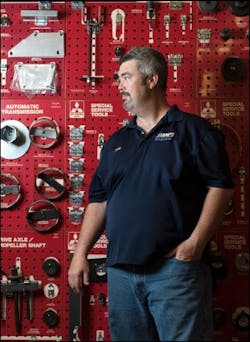In two of John Herring’s Stamps Automotive facilities, you’ll find his great-great-grandfather’s pair of Studebaker dealerships from 1913 proudly on display on canvas prints in the lobby.
Over 100 years later, the entrepreneurial spirit lives on. Growing up around cars and working for years as a technician, Herring is now set to open his sixth location in southwest Arizona.
Herring, who “didn’t want to get greasy” when he first entered the auto care world, says his career has come full circle. He has always wanted to manage multiple shops, but didn’t have the management know-how to do it.
“I've always wanted to own five stores,” Herring says. “Why I picked five? I have no idea. I guess my ego's a little bit bigger than what my capabilities were.”
Leaving the technician side and trying his hand at management, Herring quickly learned that his “capabilities” very much correlated with his self-education. After years of barely getting by as a manager, Herring took some training classes and, through his newly found marketing and managerial tactics, eventually opened his second, third, fourth, fifth, and soon-to-be sixth shops.
Stamps Automotive
Location: Six locations across southern Arizona
Average Car Count: 1,480
Annual Revenue: $6 million
And with all those shops comes a new daily routine that’s not only keeping his current shops flourishing, but opening doors for continued business growth.
When you start out and you're a one-man show, your day just flashes by, because you're in the moment, you're busy, you've got more than you can handle in one day. As you continue to be successful, you get bored. I get bored. These days, I go into a store and there's nothing I can do.
So that really changes my process of thinking as a business owner and an entrepreneur. I have to think outside the box for opening more locations and making those decisions. I spend my time evaluating my shops’ numbers and tracking our marketing success.
Two years ago, when I just owned two shops, I would start each day by going to each store and checking in with the guys. At this point, I don't necessarily go into the shops every day anymore. I had to learn to delegate my responsibilities. And a true owner doesn’t go into work every day. He doesn't need to. That's the position I’m at.
Each day, I stay in contact with my general manager. I have him get all the stats for the shops, which include things like car counts and sales. My whole responsibility is basically going over those numbers.
By looking at those stats, you can identify problems. I basically locate the problems and discuss it with my general manager and figure out a game plan to fix it. We find where the problem areas are and who or what needs to be addressed. And it’s specific each time, so that communication with the individual managers is key. By a low average car count, you can tell that service writer is not selling that well. A low car count tells you you're not doing marketing well. And I can do that stuff from home.
I keep track of the numbers once a week. I actually have a couple different ways. I use a stats website. You can go in there and create categories and keep it all tracked and make graphs of your progress.
I have my manager make the spreadsheets that give me the pertinent numbers I need from of each of these stores.
He reports weekly to me on that so I know what my total sales are for the week and I know what our gross profit is for the week. The keys to a successful shop are watching those numbers, knowing where your limits are, knowing where your numbers are supposed to be and making sure they stay in line. Really, if you do that, it's almost—I hate to say it—easy. It works really well.
I'm not a very organized person, believe it or not. I wish that was a key to my success, that it was something I could lay out in detailed form. But I don't have a detailed schedule or anything like that. We have an email system for all of our communication, which I think is key to why I’m a good manager, because I can be a good listener through email. We try to have non-verbal communication and have it written down so things aren't forgotten.
I'm an open forum for any one of my managers to call me, any one of my techs to call me. A lot of them have my personal cell phone number. They call me, text me, day or night. I have a mother-like role, overseeing the whole herd of guys.
We have 28 employees now, and they need nurturing. There's a lot of egos and a lot of attitudes that are mixed up, and that's my job to get all of those to match up and find the right fit and be the voice of reason.
Quality marketing is really where my shops started to become successful as a unit. I use direct mail as the majority of my marketing. I used to put together the mailers. It was really time consuming to do it all on my own. My kids and my wife would even help me put the mailers together.
Because of the mailers, my sales were increasing, so I felt like it was really worth it to be able to reach a lot of people—and then I found out about the monthly mail. With monthly mail, through a company called Mudlick Mail, they charge me about $300 to do it all. Since then, that’s what we’ve used.
Postcards get sent out to specific demographics and specific ZIP codes we've picked out. We definitely look and target marketing to the right clientele. We're not the type of shop you can come to and get a $19.99 oil change because, to us, that attracts the wrong kind of customer. Our average oil change is about $33. Our customers want the right kind of oil in their cars. If they do need work done on their cars, they'll definitely plan for it and put it into their budgets.
We have to do specific marketing in order to get those right kinds of people. Door hangers are something I did in the past. They're expensive to do, and in order for somebody to be attracted to a door hanger, it has to have a really good offer on it. Through trial and error, we found having a good offer on there brings in all the wrong kind of people. So I identified that kind of marketing doesn't work that well for us for the people we're trying to market to.
When you send something to somebody's mailbox, I think it's just more formal. It actually has their name on it and stuff like that. Mudlick provides an ROI tracker, which will give me the total amount of revenue brought in, the gross profit from the advertising you spent, how much you spent, how many people went to the shop, and then tracks the customers by how many new customers you have, how many repeating customers you have, and then it actually gives me a graph of a year's worth of sales. They basically interface with your management system and pull that information out. It's actually a really good tool.
I used to check my marketing sales on a weekly or bi-weekly basis. Now I get to the point where I check every couple months because it takes a little while for the numbers to come in to get an actual depiction. That's what's so frustrating with marketing for me: What you do now, you don't see an effect until two or three months down the road—unlike watching the stats of a shop. I can actually pull the stats on a shop on a daily basis and it changes.
With marketing, you don't get that. You have to make these guesses and these projections based on whatever you've experienced or situations you've been in and then hope they work three months down the road and finally get an idea. So you're always behind the ball with marketing, and I think that's why it makes it so difficult for a lot of people. They don’t understand the dynamics of how delayed marketing is. ROI tracker is on a 30-day effect. You can find out at the end of the month how many people have come in based on mail.
In order to manage multiple shops, you have to make sure you get help, because the stress is really high. Go and get education on the things you want to do. That should go for anything.
I figured out how to manage. As a technician, you have a toolbox you spend a lot of money on in order to do your job every day. What's your toolbox for managing shops? There really isn't one, so your education is your toolbox when it comes to managing that many shops.
That seems to be a common thread through a lot of shops that are struggling and trying to get going is they just don't know the ins and outs of business. They might know how to fix a car, but they don't understand the business. That's where I think a lot of people get in trouble, because I used to actually be there. I was only able to do about $30,000 a month in revenue.
Doing management education, three months later we started doing $80,00 a month. That just shows me that through management education, you can pretty much figure out whatever you need to do in order to be successful and be profitable. A lot of smaller shops are successful, but they're not profitable, and that's why they tend to just stay stagnant.

